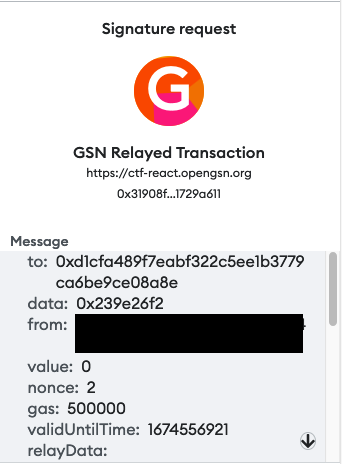Discussion for https://eips.ethereum.org/EIPS/eip-2771
Interesting read, it’s a neat way of retrieving the original transaction initiator whilst minimizing gas costs for the end user.
The proposal should be extended to support ERC20 payments to relayers as I believe this will be a common feature. Most applications will require relayers to be paid directly by users as subsidizing gas costs on mainnet will be unfeasible for most projects.
This protocol explicitly defines the interface between the “Forwarder” contract and the “Recipient” contract.
It does not define the [meta] transaction format, how it arrives to the forwarder, or who pays for relaying it.
isTrustedForwarderfunction MAY be called on-chain, and as such gas restrictions MUST be put in place. A Gas limit of 50k SHOULD be sufficient to making the decision either inside the contract, or delegating it to another contract and doing some memory access calculations, like querying a mapping.
What is the requirement being made with the “MUST” here? That contracts calling isTrustedForwarder must set a gas limit?
Similarly, the “SHOULD” requirement is a bit weird as well. Perhaps both requirements could be better written as simply:
isTrustedForwarderSHOULD NOT consume more than 50,000 gas.
Agreed. it is better wording for that.
One argument against the new wording: the previous wording makes it clear that relayers must set a gas limit for safety reasons.
Is it possible to make a call without a gas limit?
Relayers should set a reasonable gas limit, and should be aware that they may lose funds if they use defaults provided by their library.
Hi,
Thanks for all the great work on this proposal! Meta transactions have already made a big positive impact on the ecosystem and they’ll only get more important.
I’m working on wallet security and I’d like to propose that a message format containing transaction parameters becomes part of the standard.
The reason for this is that transaction simulation is the only way to give the user accurate information about the consequences of approving a transaction.
With simple transactions, the user has to sign the actual transaction data that gets executed on-chain, so we can simulate the transaction in the wallet and tell the user what’ll happen if they approve.
With meta-transactions, off-chain signatures (which may or may not contain transaction parameters) can lead to on-chain transactions, so now it’s not possible for a wallet to guarantee to users that they’ve been informed about all on-chain state changes prior to approving them.
I think the solution could be to require in EIP-2771 that the message that the user has to sign is an EIP-712 typed structured data message that contains transaction parameters.
I’m not too familiar with EIP-2771 implementations, but I noticed that OpenGSN already contains most of the needed parameters for transaction simulation (except for chainId):
So for the sake of backward compatibility, the standard could require that the EIP-712 structured data’s message object has the following properties:
address from;
address to;
uint gas;
uint value;
bytes data;
uint nonce;
uint chainId;
Looking forward to hearing your thoughts!
Best,
Agost
P.S.: Just noticed that EIP-2771 was moved to final. Not sure what’s the best way to handle my proposal now.
ERC-2771 is only about the propagation of the original caller to the target contract. The target contract trusts the Forwarder to authenticate the caller (using a signature) and perform replay protection (using nonce or other mechanism)
The logic of the Forwarder is not defined by this ERC.
OpenGSN does use ERC2771 to access a target, and the Forwarder uses EIP712, which also encode the chainId into the EIP712Domain, so it is not needed as part of the message data.
